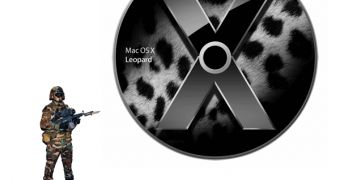This is the way that an encounter between the two parties would sound from the mouth of a third person (if the US Army and Apple were two persons). But, since they're not, things tend to be a little more complicated than that, so we have to dig further into the situation and see what we can make of it.
First of all, you may know that, during this year's summer, the US Army has experienced a series of "cyber attack" flu moments, on a number of computers that were in the care of Pentagon personnel and various defense contractors.
The second thing that made the Army consider the adoption of a number of Mac powered computers, to inhabit their soldiers' desktops, is the fact that a non-homogeneous computer base inside would prevent large scale hack attacks against the military informatics systems.
The third reason they wish to go for the Macs is that, as statistics show, the number of exploits usable on Mac OS X systems is much lower when compared with the one available for the Windows platform. One could say that this is due to the fact that the Mac user base is minute compared to the Windows one, the hackers having fewer reasons to want to gain control over a limited number of computers, when they can feast on the sea of available Windows PCs.
I couldn't agree more with this hypothesis and, as you can see, this fits like a glove the Army's needs: the fewer attacks and the fewer ways of gaining control of their computers, the better. This reason seems to be good enough for the Army to spend more money on a Mac powered machine, than on a similar PC system, therefore the Army personnel is happy to pay more money for a plus of security.
At the moment, from Army's 700.000 computer systems about 20.000 are Mac powered ones, some of them forming Xserve clusters. As C.J. Wallington, Army Lieutenant Colonel, declared: "Those [the Xserves] are some of the most attacked computers there are. But the attacks used against them are designed for Windows-based machines, so they shrug them off."
Although having the fame of being a very secure operating system over the years, the Mac OS X seems to get an increasing number of bad reports, because of the fact that hackers are turning their attention to the Mac powered systems. Proof for this fact is what F-Secure, a security company, has discovered beginning with this October.
Despite the fact that, in the last few years, the malware targeting Mac powered computers could have been counted on one hand's fingers, in the last two months F-Secure discovered not 10 or 20 malicious pieces of code that could seriously affect Macs, but over a hundred different examples. This means that the Army might get even more vulnerable to hackers' attacks, even though their Mac adoption scheme seems to be the logical thing to do right now.
We'll see if their move was the right one to make, in a year or so from now, but given the current flow of things discovered by the F-Secure company, there are serious question marks surrounding this entire matter. On the other hand, which OS is completely secure?

 14 DAY TRIAL //
14 DAY TRIAL //